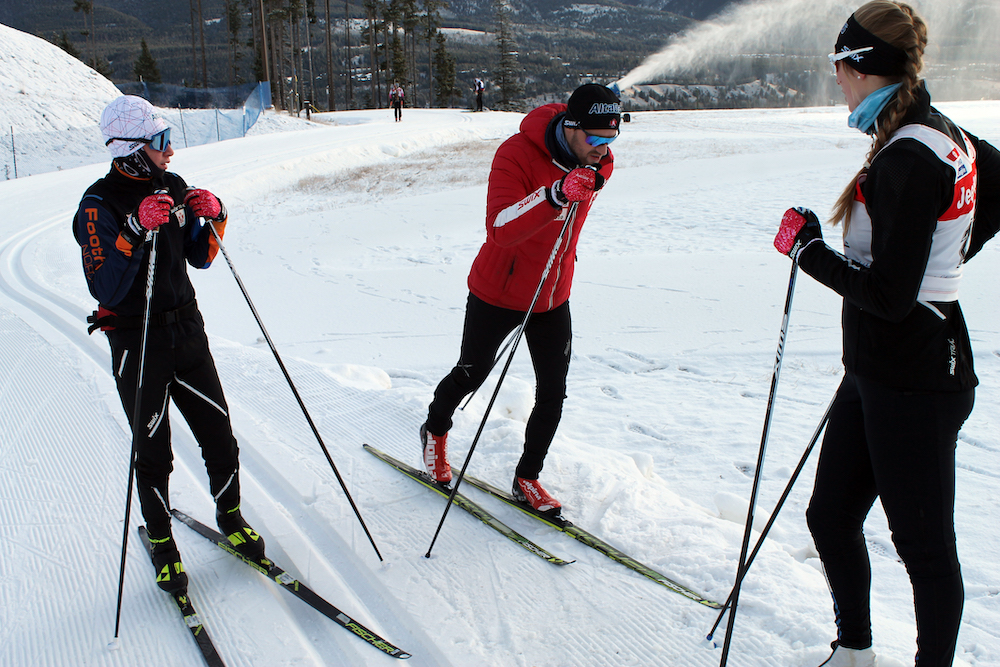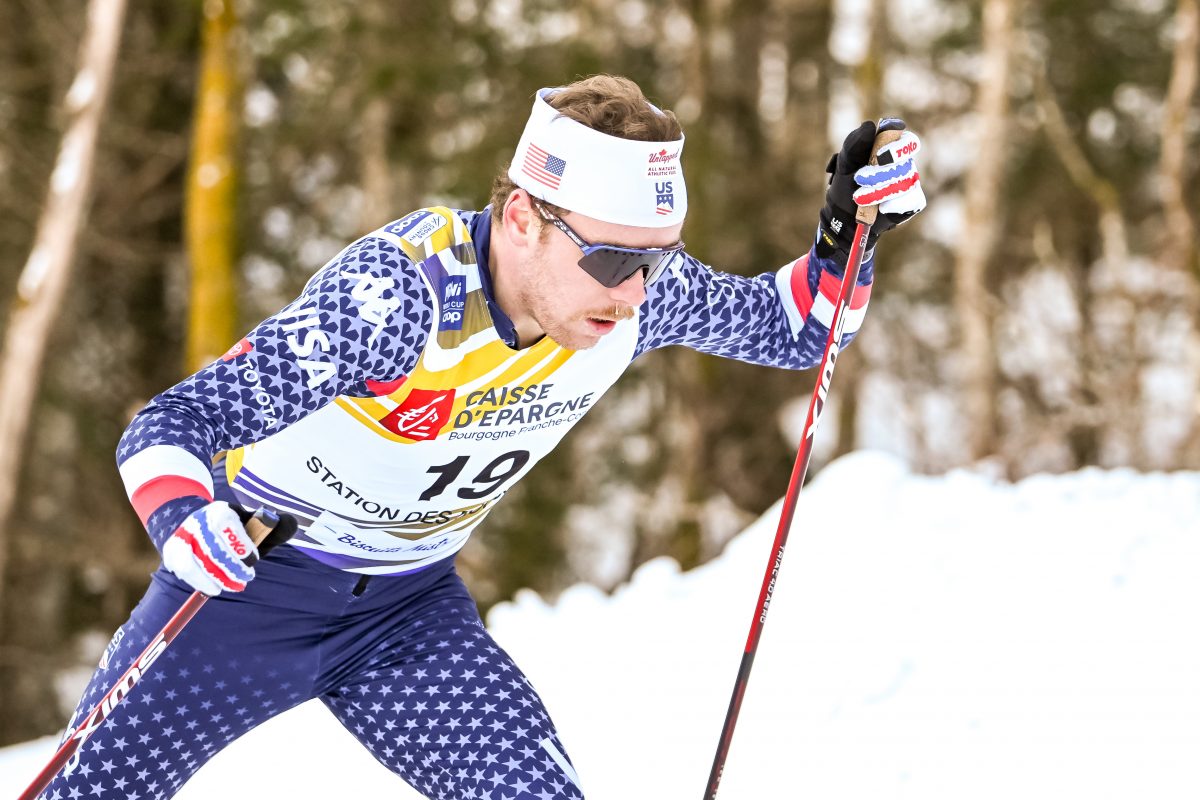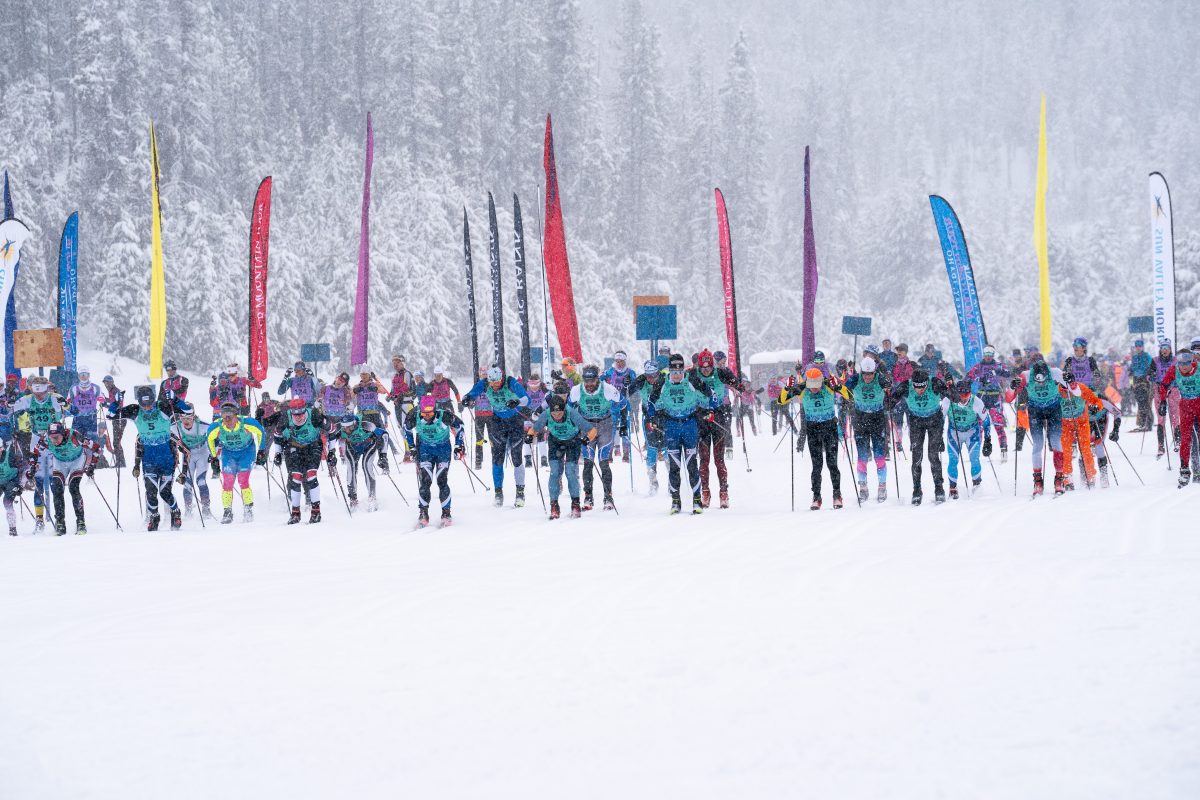
At twenty-seven-years-old, Canadian National Team coach Erik Bråten brings youthful energy and a spirit that fosters independence amongst his athletes. Originally from Oslo, Norway, and new to the Canadian system in November 2018, Bråten has the dual task of shepherding a crop of young Canadian talent and assisting veteran athletes like Dahira Beatty and Katherine Stweart-Jones to achieving consistent in-the-points racing on the World Cup.
Recently, Bråten has helped Nordiq Canada organize and produce a series of informative webinars. FasterSkier spoke with Bråten last week to check in with the coach as he begins his third year with the national team.
***
FasterSkier: In one of the Nordiq Canada webinars, you spoke at length about fostering a sense of independence amongst young and old athletes. That can be a tough dynamic to balance and it perhaps goes against the typical notion that the coach is all-knowing and the athlete the pupil. Can you talk about this a bit more?
EB: Even in preparation for the panel of athletes that included Sophie Caldwell Hamilton, Ragnhild Haga, Eirik Brandsdal, and Devon Kershaw I talked to all four of them individually, prepped a little. One of the things that came up was if you perform badly it is the skier that is off the team, not the coach. It is also, of course, when you perform well it is still your name, not the coaches. It goes both ways, do not get me wrong, the coach-athlete relationship should be super valuable and it is extremely important.
At different times I think maybe it should be more the athlete, it is not necessarily like a scale tipping with more or less importance. It shifts what the role is or the partnership between the athlete and a coach should be. It is not one set thing there. It should be a progression.
But there is a difference between how you lead a 17-year-old and a 25-year-old. I think a 25-year-old, if it is a high performing athlete on the World Cup, and podiums may be on the horizon, they have probably learned what has worked for them. They have learned about themselves. They develop an understanding of how training affects them, maybe they are like, ‘I cannot do that much hard effort over here at this time of year but over here I can.’
Or maybe the athlete is social and cannot go too long without a nice evening with friends. Whatever the perspective is, the athlete is in charge, it is their training: the final say is the athletes. They are the ones executing the activity with their body. They have the last call.
I think of it as switching from a coach to an advisory role throughout that process or maybe it is a mentor roll, whatever you call it. You write your own plan and the coach gives input versus maybe starting off with the coach writing the plan and saying here you go.
The athlete should be interested in the why, as in ‘why am I doing this?’ and they should develop a sense that this feels weird, this feels good, this feels whatever — or I have progressed here and I have not over there. Then they should be asking the coach for their input.
It goes both ways between the athlete and the coach. If an athlete takes no ownership and is simply executing like a machine, then they come to the first ski race and if the first race is bad, your season is over, practically and mentally. The athlete will have no faith in what the coach or they did because that little racing test did not work out. It is so fragile.
It is your result both good and bad as an athlete and I think coaches can be so important to set that up. To create that knowledge, to create that confidence over time both in a group situation and of course in situations where there is one to one coaching.
The day an athlete wins Olympic gold, the coach has been there up until that day and has had its purpose but I don’t think it is writing the minutes and contents of every single session to the dot for the athlete, I do not think that is the way to go. It is the athlete’s project.
FasterSkier: How are you able to give up that control, sort of emancipate the athlete, and subjugate yourself?
EB: Well, for myself included, you find that sometimes you are simply making yourself busy. You know what? Sometimes your athletes are fine, sometimes everything is working without you, sometimes the athletes do technique discussions between themselves and it is fantastic. It is your responsibility as a coach to recognize those situations or help create them, to create the framework and the culture so they keep on developing each other and of course you still give input. But do not entertain them so that you feel purposeful.
My job right now, after I teach them the basics, is to make sure they will know more about their own training — that is a primary goal if I did my job properly. So my job, now, is to keep creating the framework for the team, to keep challenging them and asking questions like are they doing too much, or too little? Are you getting too comfortable? Is everything okay in their private life?
Of course, you need to be there for them and try to make them as good as they can be, but they are the experts now on their own projects with me simply as a second pair of eyes on it.
FasterSkier: Tell me a bit about your parents. Were they what we call here in North America “helicopter parents” and you pushed away to develop a sense of independence or did they set you up with the basics and you simply asserted yourself and made your own path?
EB: We call those parents twirlers in Norway. Those were not my parents. My parents in terms of at least the training piece, they did nothing. They were pretty active themselves in cross-country, not super level but both know a lot about cross-country skiing from a masters kind of perspective and knew what they were doing in a sense. But they did not do that much other than set things up for me. I went to my first ski practice and after that, I cannot remember one single time or a race or a camp or a log where they pushed anything. They facilitated everything that I wanted to do. They made it easy for me to take part in this and pursue this.
I waxed my own skis for races starting when I was 12. And my dad is a good waxer, I just liked doing it. I liked having that control and input and feel, to learn which factors could play a role in everything and I probably skied worse for a while because my dad was better than I was, but I liked the time in the wax room doing the waxing.
I loved the ownership of both the failures and the successes. I always liked that. I like to figure out the equipment things and the training things that I wanted to do. I was very independent because I just enjoyed that part of it. My parents were there. My dad would have waxed every ski for me, but that is not what I wanted, it was also no problem for me to get it done.
I remember one time I overheated a ski and the base bubbled and my dad was like ‘oh well you won’t do that again’.
The kids need to make mistakes. Let them make mistakes. But you need to let them not overtrain, that is a very strong word, but really they need to be a bit more exhausted after a session here and there than ideally they would be because they will learn from that. They need to do a little bit too much – you cannot teach them everything. You can set them up to teach themselves, set them up to learn themselves.
Some things you can teach them right away but they need to make a few mistakes along the way: Which Olympic champion has never been injured or sick or feeling a bit down or their progression has flattened out at some point? They all needed those mistakes, let them have it.
Of course, if they overtrain for a long time, and you know it, that is not what I am talking about. You need to let them explore a couple of things.
On the national team, for example, and we have a junior coming into the team to train, he is excited and we are doing the first interval with the whole team and the first interval, the first 5 x 5-minute session or something and he just takes the lead. I know he is going to blow up — the coach should let him blow up. Not the fifth time, but the first time, let him blow up. And then do a little bit of a go-through after and ask ‘so what happened today?’
And if they reply, ‘I don’t know, I just felt really tired,’ you just have to tell them ‘no it is because of the first thing, you were in front of everyone, you started that interval set too hard.’
Let them learn by making some innocent mistakes. That is what my parents did for me, they let me play around with it.

FasterSkier: You had huge success in the Junior Worlds 4 x 5 k men’s relay with a silver. What have you learned working with that young group?
EB: In danger of making myself look like I have nothing to do with it, that silver is, yes we have never gotten a silver in a relay before, but Canada and North America, they have people coming up to that level quite frequently.
At least in Canada, there are plenty of skiers who are looking good, maybe top-12 or something possible at World Juniors. That is a great result, but it is not the most insane thing ever. But, obviously, 12 people multiplied by however many categories you have, maybe 20 people do that every year, but still, it is a promising start.
It seems like Canada when I look back on old results, probably the U.S. as well, I have not dug too much into that, but we are decent at getting to that level. But what if they are that level, and they are doing the same training as the other athletes around them, maybe you have no idea of why you got there, you have just been executing.
Maybe that last few percentages from the top level, at the senior level, you need that awareness, that kind of ownership, you need that confidence in what works for you.
For juniors, I want them knowing what works for them, or to be starting on that path, being more aware of the things that seem to work and learning that mindset versus ‘I just follow my coach’s advice, the coach got me to this point, and it seems to be working.’
I give that relay silver back to the community. Two athletes are from the same club, one BC athlete, two Alberta ones, and one from Québec, it is a good spread there. They all did an amazing job that day. They were the best when it was most important at least from a team perspective.
They delivered the race of their lives at the same time, they rose to the occasion. And yes I worked with them a bit at pre-camp, a couple I have worked with through the first few years I was here since I have come in, but to different degrees. They are a product of what they have been part of locally up to this point, which is obviously working for them.
I am almost challenging the community more in that I am asking coaches have you taught them what they need to do, not those four athletes in particular, I am talking in general. Then, if they don’t progress from there, maybe that was the problem. Not that their level at 18 was not good enough, but why did they not have the tools to develop from there.
Basically, they were benchmarking to peak at 18 and they did not keep progressing. Maybe that is their own fault and your fault as a coach. They did not know what to do, and the coach did not set up that culture of learning and independence.
FasterSkier: Tell me a bit about the Nordiq Canada webinars that you have had a hand in? Who came up with that idea?
EB: It is stolen from Norway, I created it here, but one-hundred percent form Norway. They did the same thing just six weeks ahead of us.
They started doing these Wednesday webinars. Fortunately for me, they did it in the evenings and I could just tune in. It was one topic at a time, one topic for one hour. Then they move on. They have been doing that, they had the last one last week, and I thought they would be off for the summer but they have continued doing this.
And they are going to continue doing it. They have gotten good feedback and the plan is to keep doing it regardless of Covid. They now know it works. So the concept, I thought we can do this too here in Canada.
FasterSkier: We are coming into an unsettled time in terms of how the winter might look. It appears all options are on the table as the pandemic progresses. What are your thoughts on a modified season and how it may impact athletes?
EB: Maybe we have fewer venues, and for certain we have lots of hypotheticals. Although it is maybe a bit different right now if you are in Norway, they are having camps and stuff. At least camps locally. They have a one-meter rule not a two-meter rule for social distancing, and they can have events up to 500 people. They have come a bit further.
But they are still restricted somewhat; they cannot go for the altitude camp they were planning in mid-Europe, at least for those who want to do that. Not everyone does it, but some do.
We are all in the same boat. We are all improvising this year to a certain degree when it comes to the big framework. But what we are not improvising is what the framework for good training is – two interval sessions, two strength sessions, a lot of easy distance with some speeds.
And addressing what is in an athlete’s plan, they should have found a few things that you and your coach have agreed to work on. We have this amazing opportunity to have this good continuity in training both because we cannot travel around that much, but even if we go all the way into the winter and we are compromised, we are having the extreme value of having a “training-ish” season on snow. We don’t really ever have that. We always stress the next performance in the winter normally when actually, especially for the young athletes, that is when you really develop everything, the training in the summer really sets that up.
You cannot train on dryland only and perform on snow. You need to train sometimes on snow as well. And maybe that sets up the fine line for performing when it is super important in two weeks but also thinking two years down the road — they need to do something more in the wintertime.
Maybe this is the winter where we are all kind of like, ‘I am finally going to nail that technical thing in double poling on snow because I always mess that up.’ There are many things that will open up so we need to stay motivated. If we cannot compete much this winter that will be a huge kick in the face for all of us and the same for the competition.
So if we are able to focus on what can we take advantage of from here, we can all raise the level. If we are on top of it, we can come back a year after, when everyone has come back, and we are hoping they will see that North America has really stepped up.
Jason Albert
Jason lives in Bend, Ore., and can often be seen chasing his two boys around town. He’s a self-proclaimed audio geek. That all started back in the early 1990s when he convinced a naive public radio editor he should report a story from Alaska’s, Ruth Gorge. Now, Jason’s common companion is his field-recording gear.



